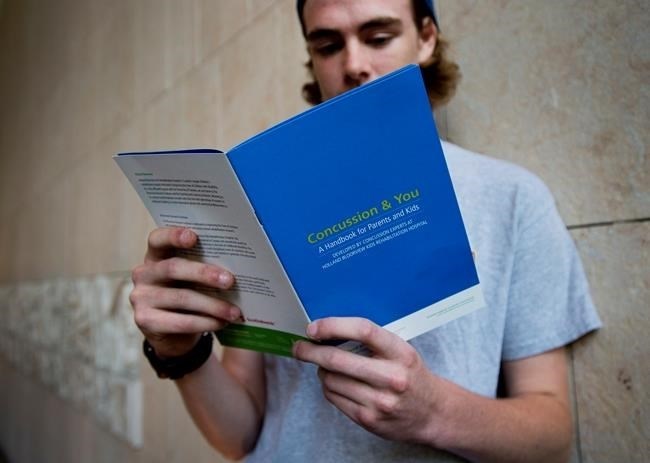
Warren McNeil, 17, poses for a photograph at the Holland Bloorview Kids Rehabilitation Hospital in Toronto on Wednesday, August 19, 2015. McNeil has suffered six concussions and had to quit playing hockey. McNeil was supporting the new tool, "Concussion & You: A Handbook for Parents and Kids."
Image Credit: THE CANADIAN PRESS/Nathan Denette
August 23, 2015 - 8:00 PM
TORONTO - At the tender age of 17, Warren McNeil considers himself a concussion veteran. He's sustained six of the brain injuries playing hockey and lacrosse, one of which knocked him out cold.
For five of those concussions, the Toronto teen was able to return to school and sports after a week or two of resting in a dark room to avoid overtaxing his healing brain.
But the last one in October — the result of being been hit from behind while playing hockey and falling head-first into the boards — was different.
Though the blow hadn't knocked him unconscious (unlike the previous one in which he got nailed in the head by a lacrosse ball while playing goal) this one seemed to "really hit me hard."
A week after the concussion, McNeil started to feel better and figured his recovery would mimic that of the previous five.
"And I went on a bike ride with a friend on the Saturday, and Sunday morning I woke up and I felt like I'd been hit by a bus," he said.
"And you don't know what to do, because I'd never had that happen before," said McNeil, who for weeks continued to experience myriad symptoms that kept him out of school and away from his usual activities: starred and blurred vision, nausea, headaches, dizziness, anxiety and depression and "horrible" concentration.
It wasn't until he and his parents attended a concussion information session at Holland-Bloorview Kids Rehabilitation Hospital that the high school student learned why he was having so many difficulties and, more importantly, what he could do to help himself recover.
The educational tools that concussion specialists provided for McNeil are now available in a free handbook that can be downloaded at http://www.hollandbloorview.ca/concussionhandbook.
"It makes concussion education accessible and digestible for kids and families," said Nick Reed, an occupational therapist and researcher at Holland-Bloorview who specializes in concussion.
The handbook not only helps parents identify when their child may have suffered a concussion and what that injury does to the brain, but it also sets out strategies for speeding up recovery and avoiding setbacks.
"I relate it to a gas-tank analogy," Reed said Wednesday during the launch of "Concussion and You: A Handbook for Parents and Kids."
"Everything we do in our life uses fuel, and our brain is that gas tank. When you have concussion, a lot of that fuel is going to healing that injury, so we don't have a lot in the tank.
"If we do too much and we're not smart about the activities we engage in," he said, "that fuel's going to run out very quickly," leading to a prolonged recovery period that for some can go on for many months.
The handbook provides tips on conserving energy, how to get good-quality sleep and proper nutrition, and relaxation exercises to protect the brain and to promote healing.
Logs for recording daily activities and their effects on symptoms are meant to help children with a concussion make and achieve reasonable goals that will help them return to school and their regular physical pursuits.
"We know that the pediatric brain does not respond the same way as the adult brain, and their lives are very, very different," said Reed.
"Also, we want to make sure that everyone involved in a young person's life — whether it be a coach, a teacher, a parent, a friend or a medical professional — are all on the same page.
"And we're hoping this concussion handbook can really help lead the way there."
Jennifer Smith, president of the 1,400-member Toronto Leaside Girls' Hockey Association and a director with the Canadian Women's Hockey League, said the handbook will be an invaluable educational tool for players, parents and coaches.
As a parent of a daughter who sustained two concussions playing hockey, Smith said it's critical that parents and coaches can recognize the signs of concussion and know how children with the injury should be cared for.
"It's terrifying when your child is injured or sick and you don't know what to do," she said. "Just having a little bit of knowledge is such a comfort to parents, (knowing) that they can take an active and pro-active role in their child's recovery."
McNeil, who has given up contact sports because of an increased risk of suffering an even more serious concussion, said he's almost fully recovered. But 10 months later, he still has times when he feels a bit "wonky."
"I think having this book in particular — that day when I wanted to go on a bike ride, knowing how far to push myself or having more information about it when I woke up that Sunday morning —would have been so comforting," he said.
"I really do think it's going to help a lot of people. The more you know about it, the better you can deal with it."
Follow @SherylUbelacker on Twitter.
News from © The Canadian Press, 2015